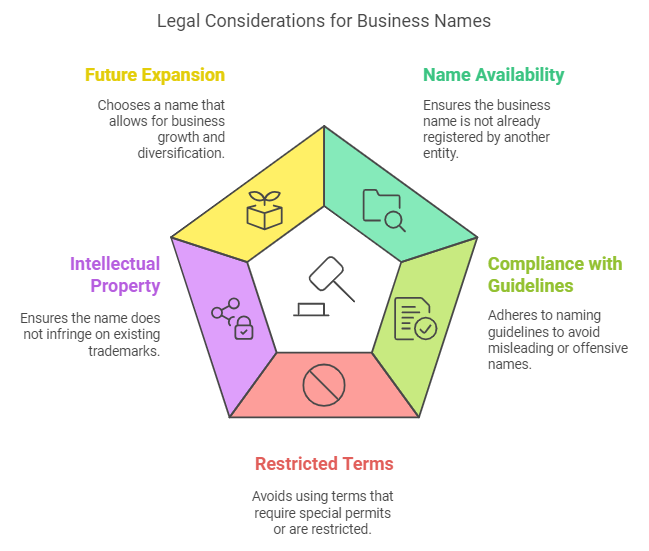Choosing the right business name is one of the pivotal decisions you'll make as an entrepreneur because a well-selected name not only captures the essence of your brand but also serves as a vital tool for distinguishing your business in a crowded market.
However, as exciting as this sounds, the process of selecting and registering a business name is filled with challenges, from legal restrictions to ensuring brand uniqueness.
This blog will guide you through the complexities of choosing a dominant business name, highlight its significance, and provide step-by-step registration instructions. You'll also learn about common pitfalls and how to avoid them, ensuring your business name stands the test of time and aligns with your long-term goals.

How To Choose and Register a Dominant Business Name For a Business in The Philippines

Choosing and registering a dominant business name in the Philippines involves careful planning, research, and compliance with legal requirements. A well-thought-out name enhances your brand identity and helps establish a strong presence in the market.
To simplify the process, follow the steps mentioned in this section to ensure your business name effectively represents your brand and is legally protected.
Here’s a step-by-step guide on how to effectively choose and register a dominant business name in the Philippines -
1. Identify Your Business Goals and Values
Consider what your business stands for and its goals. The name should reflect your brand’s identity, values, and the products or services you offer. A name that resonates with your target market can create a solid first impression.
2. Conduct Market Research
Research existing businesses in your industry to ensure your chosen name is unique and distinct from competitors. Analyze trends and customer preferences to identify naming conventions that resonate with your target audience.
3. Brainstorm Name Ideas
Generate a list of potential business names. Consider using descriptive, catchy, or memorable words that are easy to pronounce and spell. Aim for a name that captures the essence of your business and stands out in the market.
4. Check for Availability
Before finalizing a name, check its availability. Search the Securities and Exchange Commission (SEC) website for existing registered names and ensure they still need to be used. If you plan to create an online presence, you can also check the availability of domain names.
5. Get Feedback
Share your top name choices with trusted friends, family, or potential customers to gather feedback. This can help you identify possible issues with the name and ensure it resonates with your target audience.
6. Register Your Business Name
Once you’ve chosen a name, register it with the SEC if it’s for a corporation or partnership. Register with the Department of Trade and Industry (DTI) for sole proprietorships. Prepare the required documents, including your business plan and identification, and pay the necessary fees.
7. Secure Necessary Permits
After registering your business name, obtain the necessary permits and licenses from local government units (LGUs) and other regulatory bodies. This may include a business permit, barangay clearance, and other industry-specific licenses.
8. Consider Trademark Registration
To protect your business name and brand identity, consider registering it as a trademark with the Intellectual Property Office of the Philippines (IPOPHL). This provides legal protection against unauthorized use by others.
Also Read: Qualifying for a Small Business Loan: Common Requirements and Steps
Importance of Choosing a Dominant Business Name in Philippines
Selecting a dominant business name is more than an exercise in creativity; it is a foundational step that correlates with your business’s identity, legal standing, and market presence.
Here are some crucial aspects that highlight the importance of choosing a dominant business name for Philippine businesses -
1. Legal Significance and Identity
A dominant business name is your legal identifier. Registering it with the relevant authorities, such as the Department of Trade and Industry (DTI) or equivalent bodies in your region, ensures your business name is legally protected.
This means no one else can legally operate under the same name within your industry. This protection guards your brand identity from being diluted by copycats and provides a legal ground to act against unauthorized use of your name.
2. Market Differentiator
In a crowded market, standing out is crucial. A unique and memorable business name sets you apart from competitors. This differentiation can be achieved through creative puns, wordplay, or descriptive keywords hinting at your business's offerings.
Such distinctiveness is not just about aesthetics; it's about creating a competitive edge. A well-chosen name can help form an image in potential customers’ minds, making it easier for them to remember and recognize your business among a sea of similar offerings.
3. Brand Recognition
Brand recognition goes hand in hand with memorability and consistency. A dominant business name is a cornerstone for building brand recognition. Customers who quickly recall your business name are more likely to associate it with your products or services.
This connection is invaluable for branding efforts across various channels, from social media to traditional advertising. A memorable name promotes word-of-mouth marketing, one of the most potent forms of advertising.
Moreover, customers who can easily remember and pronounce your business name are likelier to refer your business to others, extending your reach organically.
4. Professional Perception
A registered business name doesn’t merely fulfill legal requirements; it also projects a professional image. This professionalism can be a critical factor in attracting customers and investors who might prefer dealing with businesses that seem more established and reliable.
5. Marketing and Advertising
A dominant business name is integral to your marketing and advertising strategies. It helps create a consistent brand image across all marketing channels. This unified approach can significantly enhance your business's visibility and reputation, ultimately contributing to its growth.
Even though it may seem costly initially, investing in branding and marketing can pay off in the long run by solidifying your market presence and driving customer loyalty.
Are you still confused about what to name your business in the Philippines? Check out this video. It offers a step-by-step process for choosing a memorable, meaningful, and effective business name. It also covers brainstorming techniques and legal considerations businesses should consider before selecting one.
Also Read: Best Lenders for Quick Cash Loans and Instant Same-Day Approval
Essential Characteristics of a Strong Dominant Business Name

A robust and dominant business name sets you apart in the market, communicates your business's essence, and helps create a lasting impression.
Here are the essential characteristics that generally a dominant business name must have to be successful in the competitive Philippine marketplace -
1. Short and Simple
One of the most valuable traits of an effective business name is simplicity. A short name is accessible for customers to type, pronounce, and remember, which is particularly important in our digital age.
Take, for instance, brands like Apple, Nike, and Target. Their crisp, open-ended names make them versatile for branding and marketing purposes.
2. Memorable and Catchy
A memorable name stays with customers long after their first encounter with your business. Memorable business names create an emotional connection and foster brand loyalty.
Consider how names like Best Buy, Coca-Cola, and Dunkin’ Donuts use alliteration to stick in your mind. Resonant names are more likely to be shared in conversations and recommended to others, leveraging powerful word-of-mouth marketing.
3. Unique and Distinctive
Standing out in a crowded marketplace requires a unique and distinctive name. A unique business name distinguishes you from your competitors and avoids any potential legal issues related to trademark conflicts.
In essence, it can convey a sense of exclusivity and quality, positively impacting a customer’s perception of the business and its services.
4. Pronounceable
Ease of pronunciation significantly contributes to a business name’s effectiveness. A name that rolls off the tongue easily is more likely to be shared through word-of-mouth recommendations. If customers stumble over how to say your name, they’ll likely forget it, which is not the best outcome for a business.
5. Hint at Business Nature
While uniqueness is vital, your business name should indicate what your business is about. This helps potential customers quickly understand what services or products you offer.
Names like 'Globe Telecom' and 'Jollibee Foods Corporation' provide hints about their telecommunications and food services business operations, respectively.
6. Align with Brand Identity
Your business name should reflect your brand’s values, mission, and vision since it basically becomes a fundamental part of your brand identity. A well-chosen name communicates what you do and hints at how and why you do it.
This alignment develops a deeper connection with your target audience, such as how 'Apple' conveys simplicity and innovation, core values that align with the company’s mission.
Also Read: Easy Business Loans and Financing Options for Small Businesses and Startups
N90’s fast financing solutions are designed for your success. Get the required business loans for your Philippine SME today! Apply today and receive loan approvals within 24 hours! Take your business to new heights with loans tailored to meet its needs.
Dominant Business Name Registration Process in The Philippines
Registering a dominant business name in the Philippines involves a systematic process to ensure compliance with legal requirements.
Here’s a step-by-step guide on how to register your business name in the Philippines -
1. Determine the Business Structure
Decide the business entity you will establish, such as a sole proprietorship, partnership, or corporation. The registration process may vary based on the chosen structure.
2. Conduct a Name Search
Before registering, perform a name search to ensure your desired business name is unique and not already in use. You can check the Securities and Exchange Commission (SEC) database for corporations and partnerships or the Department of Trade and Industry (DTI) website for sole proprietorships.
3. Choose a Dominant Business Name
Select a name that reflects your business identity and complies with naming guidelines. The name should be clear and similar to existing businesses to avoid confusion.
4. Prepare Required Documents
Gather the necessary documents for registration, which may include the following -
- Valid identification (e.g., government-issued ID)
- Accomplished application forms (DTI for sole proprietorship, SEC for corporations/partnerships)
- Additional documents specific to your business structure (e.g., partnership agreement for partnerships)
5. Register with the DTI or SEC
For sole proprietorships, visit the nearest DTI office or use the DTI online registration system. Fill out the application form and submit it along with the required documents.
For partnerships and corporations, file your application with the SEC. Submit the necessary documents, including the articles of incorporation or partnership, and pay the required fees.
6. Obtain Business Permit and Clearances
After securing your business name registration, apply for the necessary permits and clearances from your local government unit (LGU). This typically includes a business permit, barangay clearance, and other licenses specific to your industry.
7. Consider Trademark Registration
To protect your business name legally, consider registering it as a trademark with the Intellectual Property Office of the Philippines (IPOPHL). This registration safeguards your brand from unauthorized use by others.
When registering your business name with DTI, remember that your business name and brand name can differ. DTI is strict about using generic words in the business name, so ensure your chosen name follows their guidelines. Check out this Reddit thread to know more about this.
Also Read: Types and Methods of Inventory Management Systems with Examples
Legal Factors To Consider Before Selecting a Dominant Business Name in The Philippines
Various legal factors must be considered when selecting a dominant business name in the Philippines to ensure compliance and avoid potential issues.
Here are critical legal considerations for Philippine businesses to keep in mind before opting for a dominant business name -

1. Name Availability
Before finalizing a business name, thoroughly search to ensure another business still needs to register it. You can check the Securities and Exchange Commission (SEC) for corporations and partnerships or the Department of Trade and Industry (DTI) for sole proprietorships.
2. Compliance with Naming Guidelines
The business name must comply with the naming guidelines set by the DTI or SEC. Avoid names that are misleading, offensive, or suggest illegal activities. The name should accurately reflect the nature of the business.
3. Use of Restricted Terms
Certain words and phrases may be restricted or require additional permits when used in business names, such as ‘Bank,’ ‘Insurance,’ and ‘Foundation.’ Check the relevant regulations to avoid naming violations that could lead to application rejections or legal issues.
4. Intellectual Property Considerations
Ensure the chosen business name does not infringe on existing trademarks or intellectual property rights. Conduct a trademark search through the Intellectual Property Office of the Philippines (IPOPHL) to confirm that another entity still needs to trademark your name.
5. Future Expansion
When choosing a name, consider the potential for future business expansion. A specific name may limit your ability to diversify or expand into new markets. Opt for a name that can grow with your business.
6. Online Presence
Check the availability of the domain name and social media handles associated with your chosen business name. A matching domain and social media presence are crucial for branding and online visibility.
7. Local Government Regulations
Local government units (LGUs) may have specific regulations regarding business names, especially for certain industries. Verify any local requirements or restrictions that may apply to your business name selection.
Also Read: Alternative Lending Options for Small Businesses
Common Issues Philippine Businesses Face When Registering Their Business Name And Their Possible Solutions
Several common issues exist when choosing and registering a dominant business name in the Philippines. These issues can stall business operations and hamper growth prospects, but thankfully, each has effective solutions if appropriately managed.
Here, take a look at some of the common issues that businesses might face when looking to register a dominant business name in the Philippines and some possible solutions to counter them -
1. Rejected Business Names and Corrections
It can be disheartening to have your carefully chosen business name rejected. One of the primary reasons for rejection is a similarity to an existing business name. This can lead to confusion amongst consumers, which regulatory authorities aim to avoid. If your business name is rejected, you can appeal the decision.
In many states, you can formally or informally appeal the refusal. A common approach is to argue that there would be no likelihood of consumer confusion due to distinct differences in the businesses' types, names, and geographic locations.
Alternatively, you could seek consent from the blocking party, though this might involve negotiating a fee for their agreement.
2. Guidelines for Updating Business Information
Once a business name is registered, updating the information requires diligence. For example, thorough research and planning are paramount to rebranding due to limited brand traction or other reasons. Giants like Starbucks and the Co-op have successfully navigated rebranding processes to stay relevant in evolving markets.
Proprietors can update their registered business name information via the BNRS website before the registration expires. Notifying the state and the IRS about any changes is essential to avoid discrepancies.
If you need to correct an incorrect LLC name filed, you must complete a Statement or Certificate of Correction. This document will include the original business name, the corrections needed, the reasons, and the signature of an authorized person. There is generally a fee associated with this process.
3. Rectifying Typographical Errors
Even in digital times, typographical errors occur. A misspelled business name can result from handwritten errors or typing mistakes due to similar-looking letters. To avoid such issues, save your business name in digital documents with sharp fonts and always double-check the name against previous records.
Furthermore, when updating business names, particularly for online businesses facing specific DTI requirements, it's crucial to reflect these changes consistently across all branding materials and logos to maintain compliance.
Revisions to branding materials ensure that the new name is well-integrated and minimizes confusion among your audience.
Conclusion
Choosing and registering a dominant business name is the cornerstone of establishing a successful brand identity in the Philippines. This is mainly because it is more than just picking words that sound good together; it's about creating something that resonates deeply with your target audience and stands the test of time.
The benefits of selecting and registering a dominant business name extend far beyond the initial setup. For one, it’s essential for legal compliance. In the Philippines, a registered business name is a prerequisite for obtaining necessary permits, such as a business or mayor's permit, ensuring that your operations are above board from day one.
Moreover, a registered business name is also a stepping stone for obtaining trademark protection from the Intellectual Property Office of the Philippines (IPOPHIL). This legal shield prevents others from using your brand's name and identity, safeguarding your business from potential imitations or infringements.
Finally, a well-chosen business name could become synonymous with the quality and excellence your business strives for. It can establish a persistent presence, making your business be remembered long after its inception. This lasting impression can be a source of pride and a selling point for future generations.
Frequently Asked Questions (FAQs)
1. How do I choose a business name in the Philippines?
Choosing a business name in the Philippines involves several key steps. They are as follows -
- First, brainstorm names that reflect your brand identity and resonate with your target market. Ensure the name is unique and not already in use by conducting a name search on the Securities and Exchange Commission (SEC) or Department of Trade and Industry (DTI) websites.
- Consider the ease of spelling and pronunciation for better recall. Check for available domain names and social media handles to maintain a consistent online presence.
- Lastly, compliance with naming regulations must be ensured, and restricted terms must be avoided to prevent legal issues during registration.
2. What is the dominant name in business registration?
The dominant name in business registration refers to the primary name under which a business operates and is officially registered with the appropriate government authority, such as the Department of Trade and Industry (DTI) for sole proprietorships or the Securities and Exchange Commission (SEC) for corporations and partnerships.
It must be unique, compliant with regulations, and reflective of the business's identity.
3. How do you register your business name in the Philippines?
To register your business name in the Philippines, follow these steps:
- Choose a Business Name: Select a unique name that reflects your brand and complies with naming regulations.
- Conduct a Name Search: Check the DTI or SEC databases to ensure your desired name is not already registered.
- Prepare Required Documents: Gather necessary documents, such as valid ID and application forms.
- Register with DTI or SEC: For sole proprietorships, visit a DTI office or use the online registration system. For corporations/partnerships, file your application with the SEC.
- Obtain Business Permits: Secure local permits from the local government unit (LGU) after registration.
4. How much does the Philippines' DTI business name registration cost?
The cost of DTI business name registration in the Philippines varies based on the registration type and the duration of the business name's validity. Generally, the registration fee is around PHP 200 to PHP 2k.
Additional fees may apply for specific services, such as amendments or renewals, so checking the DTI website or local offices for the latest fee structure is advisable.













